
Photo taken on September 19, 2022 shows the 79th Press Conference on Xinjiang Uygur Autonomous Region. Photo by Xinjiang Daily/ Cheng Weiqiang
Xu Guixiang:Good afternoon, friends from the press, welcome to the 79th press conference of Xinjiang Uygur Autonomous Region. I am Xu Guixiang, spokesman of the People's Government of Xinjiang Uygur Autonomous Region.
The main content of today's press conference is to share information about the containment of the recent COVID-19 outbreak in Xinjiang. With me here is Mr. Elzat Zada, Deputy Director-General of the Health Commission of Xinjiang Uygur Autonomous Region. In addition, we will also be joined by nine related personnel who will talk with you via video link. They are: Ni Mingjian, chief expert of Xinjiang Center for Disease Control and Prevention; Elshat Tursunbay, head of Ili Prefecture; Altaygul Juma, chairwoman of Ili Prefectural Women's Federation; Qiao Xuegang, executive vice mayor of Yining City, Ili Prefecture; Dilmurat Nurahmat, vice president of Xinhua Hospital of Ili Prefecture; Saynam Tuniyaz, director of Jigdilik Community, Dolatbagh Street, Yining City, Ili Prefecture; Elijan Tuhongjan, a doctor-in-charge of Xinjiang Children's Hospital; Aliya Keram, a resident of Tashkoruk Township, Yining City, Ili Prefecture; Zulkana Mamuk, a resident of Jiefang Road, Yining City, Ili Prefecture.

Photo taken on September 19, 2022 shows Xu Guixiang, spokesman of People’s Government of Xinjiang Uygur Autonomous Region speaks at the 79th Press Conference on Xinjiang Uygur Autonomous Region. Photo by Xinjiang Daily/ Cheng Weiqiang
Recently, there have been COVID-19 outbreaks in some areas of Xinjiang, which have affected the normal work, life and health of the local people. The governments at all levels in Xinjiang have put the people and their lives and safety front and center, and worked together with the people of all ethnic groups to fight the pandemic and overcome difficulties, making arduous efforts to defeat the pandemic at an early date and achieve the maximum effect of COVID-19 containment.
We believe that the rights to life and health are the most essential human rights. Without life and health, all other rights are difficult to realize. This is the general truth and what really matters to all. In the face of the severe COVID situation, the governments at all levels in Xinjiang did not take a laid-back approach for or stop fighting the pandemic. Instead, they have fought against the virus and disease and stood by the people to resolutely safeguard the people's lives, health and safety. This is a just act of being responsible to the people and protecting their lives, which demonstrates the senses of mission and responsibility of a responsible government and has been positively evaluated by the international community.
However, some overseas anti-China elements and individual media outlets ignored the anti-epidemic efforts of the local governments, the hard work of thousands of community workers, and the understanding and support of the people of all ethnic groups in Xinjiang. They maligned the rational epidemic containment measures as "violent law enforcement", the temporary inconveniences caused by the local COVID protocol as "human rights violations", and emotional expressions of a few individuals as "collective protest". Rather than being concerned about the human rights of the people in Xinjiang, they just want to politicize and instrumentalize the COVID containment work in Xinjiang, hamper Xinjiang’s economic and social development, infringe on the interests of the Xinjiang people, and undermine the stability and peace of this region. Their sinister doings are despised by all.
Next, I’ll give the floor to Mr. Elzat Zada, Deputy Director-General of Xinjiang Health Commission to share the relevant information.
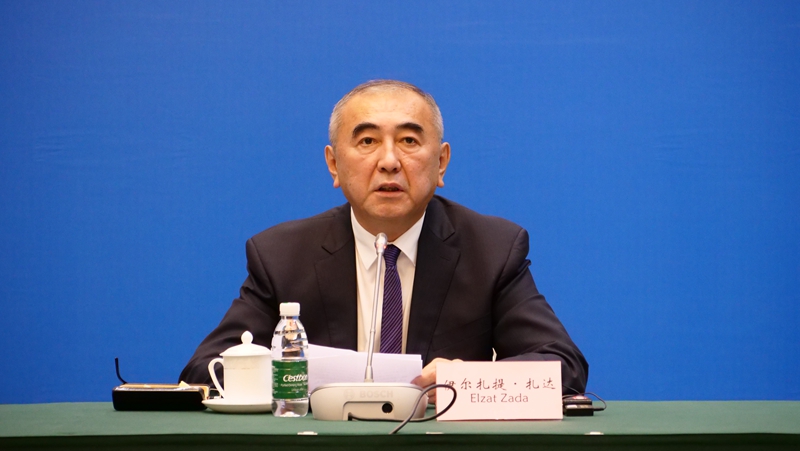
Photo taken on September 19, 2022 shows Elzat Zada, deputy director of the Health Commission of Xinjiang Uygur Autonomous Region speaks at the 79th Press Conference on Xinjiang Uygur Autonomous Region. Photo by Xinjiang Daily/ Cheng Weiqiang
Elzat Zada: After the outbreak of COVID-19 in Xinjiang, we have taken strict epidemic prevention and control measures, and focused on the goals and tasks of "prevention of proliferation and spillover" and "dynamic zero elimination", and made every effort to implement all tasks of epidemic control. At present, the epidemic prevention and control in Xinjiang is basically improving, and the low-risk areas are gradually resuming the normal order of production and life. Next, I would like to focus on the epidemic containment in Ili Kazak Autonomous Prefecture of Xinjiang.
1. Major efforts in improving nucleic acid testing capacity. We have scientifically standardized every line of work in nucleic acid screening, such as collection, delivery, testing and reporting, assigned specific individuals to take charge of each laboratory, optimized and improved nucleic acid testing tactics, and dynamically adjusted laboratory testing tasks. Electronic QR codes for nucleic acid testing have been created in collaboration with multiple communication operators, so that the nucleic acid testing is completed efficiently. We have accelerated the improvement of nucleic acid testing capacity, with the testing capacity of Ili Prefecture alone having reached 641,000 samples per day.
2. Accelerated epidemiological investigation. Pooling strengths from all departments, we have established a 200-person joint epidemiological investigation working group, and 65 emergency sampling teams with a total of 130 professionals. Once a positive case is detected, epidemiological investigation and tackling is completed in eight hours in urban areas and ten hours in rural areas following a whole-chain parallel-running handling mechanism that integrates epidemiological investigation, referral, isolation and treatment. We have stepped up incremental expansion of quarantine centers and continue to optimize and integrate them by building new quarantine centers, setting up tents, and recycling quarantine rooms. We have also refined and improved the quarantine center management and the norms and procedures for release from quarantine, and enhanced the health monitoring, referral, quarantine, locked-down management and control, psychological counseling and other work.
3. Scientific medical treatment. We have transferred eight rescue and treatment teams and 830 medical professionals to take over the designated hospitals as a whole, and conduct remote consultation with the autonomous regional designated hospitals for scientific treatment of the patients. Three new makeshift hospitals with a total of 2,537 beds have been built. There are all together 4,062 beds in designated hospitals and makeshift hospitals in the prefecture. We also improved the admission, diagnosis, treatment and discharge processes of designated hospitals and makeshift hospitals, so that all those eligible are discharged from hospital as early as possible.
4. Ensured access to medical care for the people. We have actively carried out online diagnosis, treatment and consultation, and set up 33 medical service teams to provide timely medical consultation and door-to-door diagnosis and treatment services for patients with mild illness. Two yellow-code hospitals have been designated to receive people from high-risk areas in a standardized way, six general hospitals orderly receive people from low-risk areas, and nine mobile hemodialysis cabins were purchased, to improve the medical conditions of the people during the outbreak.
Xu Guixiang:Next,we have a video link with Ni Mingjian, chief expert of the Xinjiang Center for Disease Control and Prevention, to brief him on the current round of COVID-19 in Xinjiang.
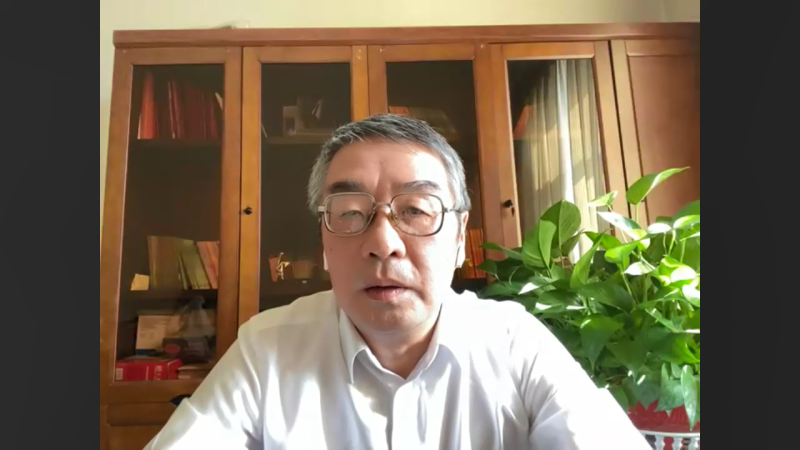
Photo taken on September 19, 2022 shows Ni Mingjian, chief expert of Xinjiang Center for Disease Control and Prevention speaks via video link at the 79th Press Conference on Xinjiang Uygur Autonomous Region. Photo by Xinjiang Daily/ Cheng Weiqiang
Ni Mingjian:Hello everyone! I am Ni Mingjian from Xinjiang Center for Disease Control and Prevention. I would like to introduce the Covid-19 epidemic situation and prevention and control during this round of the outbreak in Xinjiang, especially in Ili Prefecture. In general, this round of Covid-19 has the following characteristics:
First, the Covid-19 epidemic is highly infectious. We discovered that this round of epidemic in Xinjiang is highly infectious, and the average incubation period of 2-3 days is comparatively shorter than before. Some of the infected people have started to have caused latent spread before positive result of nucleic acid test confirmed. For example, Yining City has implemented citywide static management since the beginning of August. On August 18, a community volunteer from Jiangnan residential complex at Dunmaili Street of Yining City was tested positive. On August 20, his neighbor downstairs was also tested positive. On August 21, 16 persons were tested positive in the residential complex, and all of them were in the same buildings where the first case and the second case live.
Second, the Covid-19 epidemic spreads faster. Compared with the past, the spread of this round of epidemic is obviously faster. Till the 7th day of the outbreak, it has affected 4 prefecture-level areas (prefectures, cities), 6 counties (cities, districts), and 153 cases infected were reported; till the 14th day, it has affected 13 prefecture-level areas (prefectures, cities), 6 counties (cities, districts), and 1,666 cases infected were reported. By September 16, 5,371 cases of infection had been reported in Xinjiang. For example, one case infected was confirmed in Gangou Village, Bayandai Town, Yining City on August 5, and soon 13 people in total who were his close contacts within 3 days were tested positive in nucleic acid testing; Till August 11, 35 cases in the same transmission chain have been found in the village. For example, two sisters in Dolatbagh Street of Yining City on August 8 were required home-quarantine due to contact with positive infected persons. And then they were tested positive on August 9. On August 13, 9 persons in the same street were tested positive. From August 14 to 19, 21 cases were tested positive in the same street and neighboring street.
Third, most of the infected people are asymptomatic carriers. Up to now, 152 confirmed cases have been reported in Xinjiang, accounting for 2.6% of the total number of reported infections, and most of them are mild Covid-19 infections or moderate ones. The remaining 5,200 cases were asymptomatic.
At present, the epidemic situation in Xinjiang remains stable generally, the prevention and control efforts have delivered positive results, and the number of newly reported infections continues to decline. Up until 24:00 on September 16, no new infections have been reported for more than 14 days from 7 of the 13 prefectures (cities) affected by this round of epidemic. Most of the affected counties and cities (districts) have basically restored the production and life order.
Xu Guixiang:Next, Elshat Tursunbay, head of Ili Prefecture, will join us via video link to introduce the epidemic prevention and control situation in Ili Kazakh Autonomous Prefecture of Xinjiang.
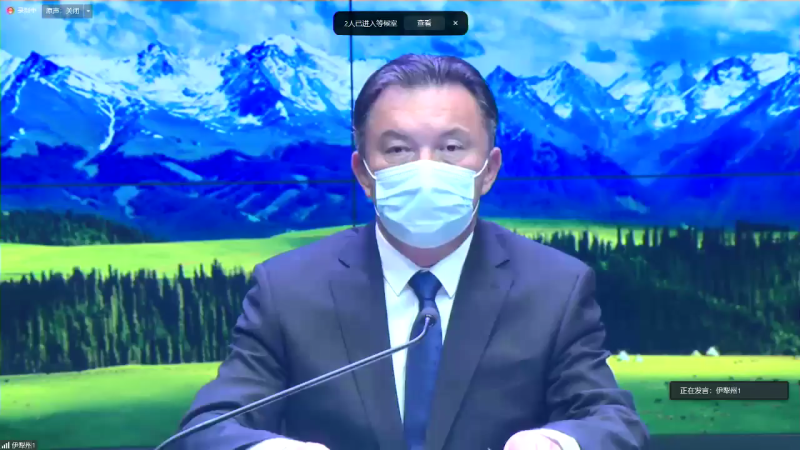
Photo taken on September 19, 2022 shows Elshat Tursunbay, head of Ili Prefecture speaks via video link at the 79th Press Conference on Xinjiang Uygur Autonomous Region. Photo by Xinjiang Daily/ Cheng Weiqiang
Elshat Tursunbay:Since the outbreak of Covid-19, Ili Prefecture upholds the general strategy of "prevent both inbound cases and domestic resurgences of Covid-19" and a dynamic zero-Covid policy. And a joint working group on epidemic prevention and control has been established for a flat and efficient command system, upholding rapid response to emergency needs of Covid-19 containment and focusing on nucleic acid testing, quarantine and control, medical treatment, supplies, and solving the difficulties and demands of the masses. At present, the positive momentum of control and prevention is expanding, and the number of new local asymptomatic infections continues to decline, and the area affected by the epidemic continues to decrease. The whole prefecture is gradually back to the restoration of production and life order. Now, I'd like to introduce our work to you.
First, we strengthen targeted and detailed prevention and control. We will conscientiously implement the Protocol on Prevention and Control of Covid-19 (Edition 9) of the joint prevention and control mechanism of the State Council, following region-specific, multi-level targeted approach to epidemic prevention and control and making dynamic adjustments of high, middle, and low-risk areas. In this process, we terminated the quarantine in time for those who meet the conditions. In accordance with the requirement classification management, residents in high-risk area are supposed to "take home quarantine and be provided door-to-door services", residents in medium-risk area are supposed to "stay in residential complex and take outdoor activities in an orderly way", residents in low-risk area are supposed to strengthen personal protection and avoid overcrowding". These measures have been taken to protect the life safety and health of people of ethnic groups to the maximum extent.
The second is to strengthen the guarantee of people's livelihood. We will make every effort to ensure smooth logistics, stable supply chains, agricultural production, basic livelihood, and relief, so as to minimize the impact of the epidemic on economic and social development. We ensure reserve of important commodities for people's livelihood and medical supplies. We established a daily reporting system for production capacity of important agricultural products and a mechanism for joint guarantee and supply of daily necessities. We formulated the Plan on Ensuring Supply during the Epidemic Control Period, giving play to the role of Yining Rural Commercial Group. 9 large supermarkets are open, which ensures the normal operation of the Ili Jiuding Agricultural Products Wholesale Market, and orderly restoring the normal operation of shops and vegetable stores in the community without epidemic risk by adopting online ordering, offline distribution and other modes, so as to achieve adequate supply, stable prices and sound guarantee. The prefecture government allocated a special fund of 40 million yuan for assisting the disadvantaged groups and isolated people, and strengthened efforts to solve the problems of people of all ethnic groups.
The third is to steadily and orderly promote the quarantine removal. For the community or block where there is no epidemic within 10 days and no abnormality in the two rounds of national nucleic acid testing, the static management will be removed after research and judgment.
The fourth is to strengthen the response to appeals and concerns. People.cn, Pomegranate Cloud and 12345, 100 phone service, as well as mobile apps and official accounts on WeChat (QR code provided) are mobilized to collect appeals and concerns and inquiries. We have staffed up hotline service teams at all levels including prefecture, city and village, improved mechanisms through which people can voice their demands, increased efficiency and quality in answering questions and solving problems,so as to respond to social concerns in a timely manner.
Fifth, we should make overall plans for the coordination of epidemic prevention and control and economic and social development, and for the coordination of development and safety. We are working hard to guarantee a sound operation in the areas including agricultural and animal husbandry production, project construction, economic development, and production safety, to make up for the time lost in the epidemic and minimize the losses caused by the epidemic.
At present, the epidemic prevention and control in Ili Prefecture is generally performed positively However, due to the complexity of the epidemic transmission, the task of winning the battle for epidemic prevention and control is still very arduous. We will further strengthen the implementation of various measures, achieve the goal of dynamic zero COVID as soon as possible, and strive to restore normal production and life.
Xu Guixiang:Following that, we are going to meet Altaygul Juma, chairwoman of Ili Prefectural Women's Federation, and ask her to brief us on how Ili Kazakh Autonomous Prefecture cares for women and children in the process of epidemic prevention and control.
Xu Guixiang:The Women’s Federation of Ili Kazak Autonomous Prefecture has been concerned about special groups such as women and children since the outbreak of this round of Covid-19 pandemic.
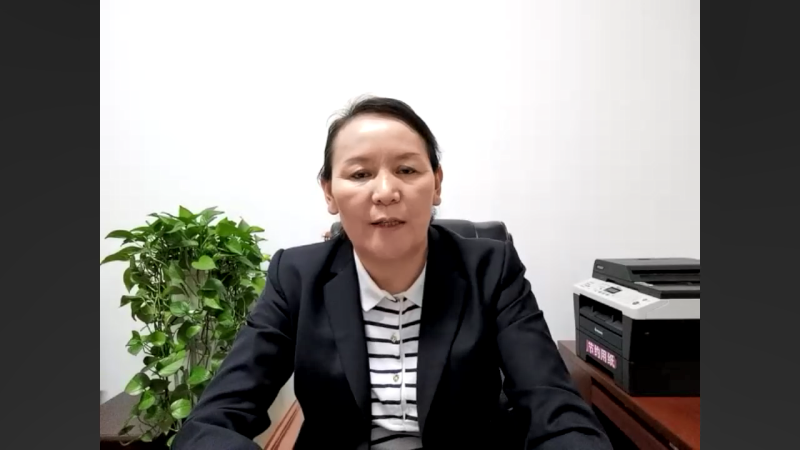
Photo taken on September 19, 2022 shows Altaygul Juma, chairwoman of Ili Prefectural Women's Federation speaks via video link at the 79th Press Conference on Xinjiang Uygur Autonomous Region. Photo by Xinjiang Daily/ Cheng Weiqiang
Altaygul Juma:First, we have provided sincere caring and timely help to the families in need. Since the outbreak of the pandemic, the team of volunteers made up of 15,283 women from community-levels of the women’s federation, executive committee of women’s federation, and warmhearted mothers was set up to combat the pandemic. Due to their familiarity with local people and conditions, they could collect feedback and appeals from families, women and children in difficulty and help them solve all kinds of difficulties in a timely manner. Meanwhile, they have provided online service to send care, offer education on legal knowledge and mental and physical health to thousands of families to help them get through the special phase.
Xu Guixiang:I know your federation runs a hotline 12338. Please share with us more about how you safeguard people’s legitimate rights through the service.
Altaygul Juma:Third, we have made all-out efforts to safeguard the legitimate rights and interests of women and children. We have given full play to the role of the Women’s Psychological Assistance hotline12338 to smooth channels for rights protection. For more complex situations, we would transfer them to the local neighbourhood(community) or police station to conduct survey and cooperate with relevant departments to resolve conflicts and disputes properly. We continuously provide psychological counseling, conflict resolution, legal aid, health guidance and other warm services to minimize the psychological panic and anxiety caused by the epidemic and help them stay at home at ease.
Xu Guixiang:During the epidemic prevention and control, what impressed and touched you the most?
Altaygul Juma:A few days ago, a worker of our community received a call from Mr. Ma, whose wife’s water broke and she was about to deliver the baby. Hearing that, the community worker took no time calling for transport, and the fast-track mechanism was then activated. The lady was transported to the hospital in no more than 30 minutes. About an hour later, Mr. Ma called back, saying that his wife gave birth to a baby girl and both of them healthy and stable. In such special circumstances, women’s federation at various levels, together with other forces, are working hard in safeguarding women and children’s rights, with no let-up in their effort.
Xu Guixiang:Thanks. I am touched, too. At critical moments like that, women’s federations have played an special role and won understanding and trust form the public. Thank you again, as well as you colleagues. And hope you can provide even better services to the public in the future.
Xu Guixiang:Next, we are going to be joined by Dilmurat Nurahmat, vice president of Xinhua Hospital of Ili Prefecture, who will introduce how timely treatment is ensured for patients during the Covid time.
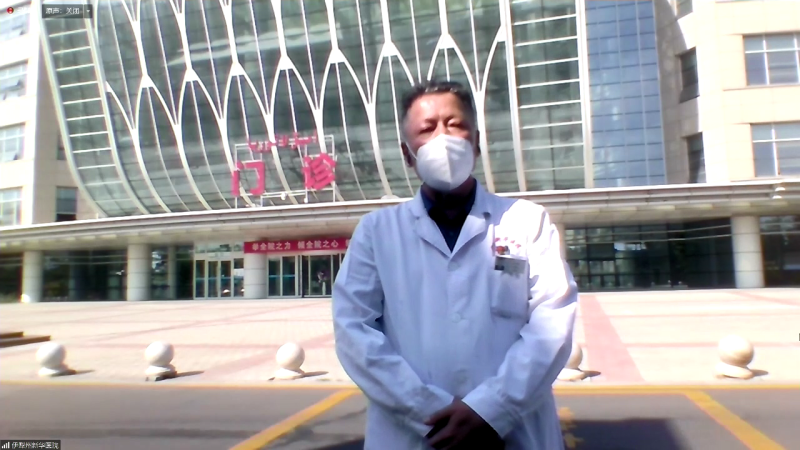
Photo taken on September 19, 2022 shows Dilmurat Nurahmat, vice president of Xinhua Hospital of Ili Prefecture speaks via video link at the 79th Press Conference on Xinjiang Uygur Autonomous Region. Photo by Xinjiang Daily/ Cheng Weiqiang
Dilimlat Nulahmait:Hello, everyone, I’m Dilimlat Nulahmait of Uyghur ethnicity and I now work as the vice president of Xinhua Hospital, Ili Prefecture, Xinjiang. I have been working in the medical sector for 32 years in Ili. Since the outbreak of this round of Covid-19 pandemic, all the medical institutions in Ili have put the life of all people before anything else and have done everything within our ability to save people’s lives. Xinhua Hospital takes the responsibility of medical treatment for people under medical observation (quarantine) from medium-and high-risk areas and centralized quarantine sites. We have done the work in the following aspects:
First, we have integrated resources and reorganized departments reasonably. We have redivided the medical areas according to the functions, set up emergency department, internal medicine department, surgical department, pediatrics, obstetrics and gynecology, ICU, neonatal department, dialysis department, operating rooms, and added isolation wards according to standards. People came to the hospital for diagnosis or treatment have been under closed-loop management in strict accordance with the hospital infection prevention and control standards. Since Aug 16, 2,891 patients have been treated at Xinhua Hospital. Among them, 167 pregnant women were hospitalized in obstetric department; all high-risk pregnant women delivered babies safely, and 167 new lives were born. The diagnosis and treatment work was carried out smoothly and orderly.
Second, we have classified diagnosis and treatment to provide high-quality medical services. We maintain that both the Internet service and the treatment in hospital should be fully employed. Internet services refer to release the hospital’s appointment phone number, guide to the treatment process through all kinds of media to facilitate people of all ethnic groups get online consultation and treatment through the hospital’s WeChat applet. Up to now, 1,496 people have received Internet services through the hospital’s online platform. Diagnosis and treatment on the spot means people of all ethnic groups come to the hospital for treatment. The treatments have been under closed-loop management, namely patients were driven to the hospital from their village(community) or centralized quarantine sites directly to the hospital without stopping at other places or contacts with other people. It’s conducted the same way when the patient’s treatment is completed at the hospital.
Third, emergency routes have been set up to rescue patients with urgent conditions and with critical conditions. Our hospital has set up emergency channels to treat and rescue the critically ill patients and patients with urgent conditions, patients who need surgery, tumor chemotherapy, dialysis, pregnant women, infants and young children at the earliest time possible. We have also set up four wards for dialysis patients only, and formed a dialysis team consisting of four doctors and 16 nurses to stay on duty 24 hours a day to ensure that dialysis treatment is not delayed.
Forth, we have strengthened convenience services and cared for the medical staff. We treated people of all ethnic groups who came to the hospital for treatment as our family members. We provided free meals, hot water for patients and their caregivers; blankets, quilts and covers and wheelchairs for the elderly and infants. Since the beginning of the pandemic of this round, all the medical workers have been under great mental and physical stress. Therefore, we have strengthened the care for them, providing conditions to guarantee good rest for them. At present, our medical staff are healthy and in good mental and physical condition.
Xu Guixiang: Next, please watch a clip of video to get to know how local residents in Yining City are receiving medical treatment during the outbreak.
Xu Guixiang: Next, we will talk to Qiao Xuegang, executive deputy mayor of Yining City, Ili Kazak Autonomous Prefecture, Xinjiang via video link, and ask him to introduce the supply of materials in Yining City.
Xu Guixiang: Thank you for attending this press conference. As mayor, your job is related to the livelihood of thousands of households. Please introduce what problems have you encountered during the response to the outbreak, what difficulties have the masses complained about, and what measures have you taken?
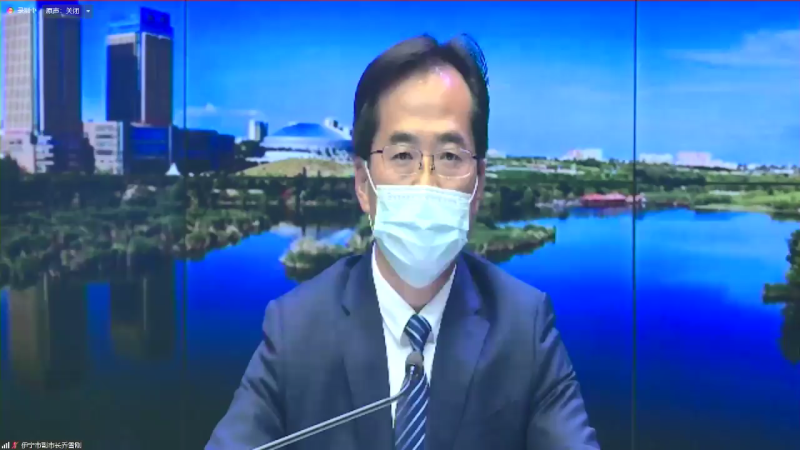
Photo taken on September 19, 2022 shows Qiao Xuegang, executive vice mayor of Yining City, Ili Prefecture speaks via video link at the 79th Press Conference on Xinjiang Uygur Autonomous Region. Photo by Xinjiang Daily/ Cheng Weiqiang
Qiao Xuegang: Hello everyone! We appreciate the attention and support from people of all walks of life to the epidemic response in Yining City. After the outbreak of Covid-19, we focused on the difficulties reported by the people of all ethnic groups, such as material supply, medical treatment, and entry or exit, and we made efforts particularly in the following aspects.
First, a four-tiered hotline mechanism was implemented covering Prefecture-, city-, sub-district-/township-, and community-level. The joint office of 12315 in Yining Prefecture and 12315 in Yining City was in place. A hotline covering townships and villages was set up. The number of telephonists was expanded in an effort to identify and handle the problems reported by the masses as soon as possible.
Second, we’ve accelerated the handling of problems by adopting a 24-hour system for resolution. We have coordinated various platforms such as 12345 hotline and People 's Daily Message. Questions are replied on the spot by telephonists whenever possible, and those that can not be promptly answered will be quickly forwarded to relevant departments. We are responding to and handling incidents of particular urgency.
Third, we have intensified efforts to review the handling of complaints, organized personnel to establish a specific team and a return visit group for the complaints of the masses, summarized the handling information to each township and street every day, and conducted a detailed return visit against cases yet to be closed and track the handling progress, in addition to careful explanations to the relevant people. On September 17, the number of calls received by the 12345 platform reached 7149, of which 6383 were answered and handled on spot.
Through the above work measures, we have continuously unblocked the feedback channels for the complaints and demands of the people, continuously improved the handling quality, and maximized our efforts to solve various problems such as some urgent concerns submitted by the people of different ethnicities.
Xu Guixiang: We also learned that everyone is very concerned about the lives of local residents in Yining City, especially how their daily lives are guaranteed and goods are supplied during the static management of the city, and what work has been carried out?
Qiao Xuegang: we have strengthened the capacity of necessities supply. We set up a supply system characterized by centralized distribution by Yining Agricultural and Commercial Group and downstream distribution from township (street) stations to designated supply sites at grassroots level. We have added new supply stations, increased distribution vehicles and optimized and expanded supply team that aims to supply rice, flour, oil, meat, eggs, milk, vegetables, fruits. Now there are a total of 1,074 material supply sites involving 2,916 personnel and 1,113 vehicles. As Jiuding Agricultural Trade Market resumes its operation, we can deliver 200-260 tons of vegetables, 250 tons of flour, 50 tons of oil, 65 tons of rice, 30 tons of meat, 22 tons of eggs, 31 tons of milk and 50 tons of fruit daily. Necessities for the elderly and milk powders for children can be bought at the supermarkets approved for operation by the government.
Xu Guixiang: I noticed that some time ago some netizens were worried about whether material supply storage can be ensured. Could you provide more details on such concerns?
Xu Guixiang: How is the quality inspection carried out with these goods?
Qiao Xuegang: In order to ensure the quality of goods, we have reinforced the supervision and inspection of the market, cracked down on illegal acts such as forcing up prices and price fraud in accordance with the law, and publicly exposed typical cases of severe nature to ensure stable prices. At present, a total of 1,703 supply sites have been inspected, 1,262 complaints have been accepted with a completion rate of 100%, saving an economic loss worth 61,129.8 yuan. 27 cases of illegal acts such as forcing up prices, disturbing social order and selling expired food were filed and investigated in accordance with the law, and 14 cases were exposed to the public and closed.
Xu Guixiang: Special groups such as the elderly may run into some inconveniences in life and thus require some special care and help. What work has the local government done in this regard?
Qiao Xuegang: The government of Yining City also appears intent on the groups with special difficulties since they are a group of individuals more prone to difficulties during the epidemic. Since the outbreak, our government has prioritized the care for the groups with difficulties, giving full play to the role of social assistance in "securing the bottom line and relieving the emergency". Specifically, we have distributed a total of 35,768,000 yuan as various subsidy funds such as urban and rural subsistence allowance and special subsidy for the impoverished, benefiting 66,111 people. Another 3,029,300 yuan has been distributed as the subsidies for the elderly over 80 years of age and for disabled people respectively, benefiting 29,123 people. Greater attention has been given to the life security of groups with special difficulties, who have been provided with free packs of vegetables and beef, benefiting 4,636 households with difficulties. We have also given out free gift bags of supplies, benefiting 25,777 households in need. In addition, fruits have been provided free of charge to the infected individuals who were lifted out of centralized isolation to ensure that their lives were guaranteed. Thank you!
Xu Guixiang: Next, please watch a clip of video to learn the supply guarantee in Yining City during this outbreak.
Xu Guixiang: Next, we will talk to Sanam Tuniyaz, director of Jigdilik Community, Dolatbagh Street, Yining City, Xinjiang via video link, and asked her to introduce the community service for people during the epidemic in Yining City.
Xu Guixiang: Hello! What is the basic situation in your community? How many households and residents are there?
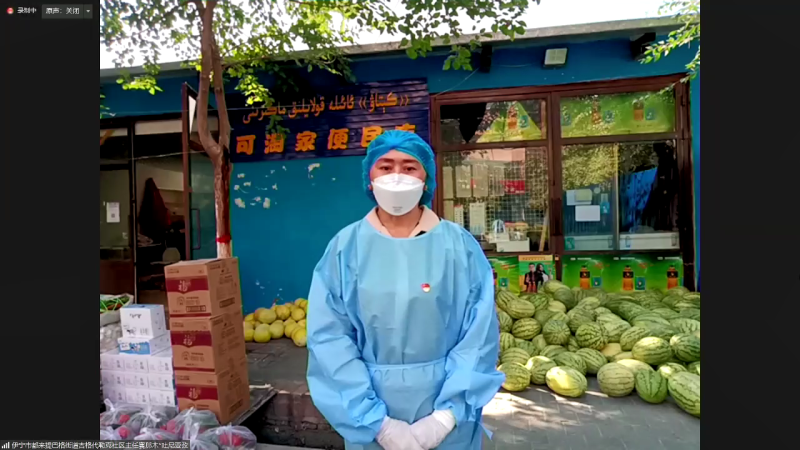
Photo taken on September 19, 2022 shows Saynam Tuniyaz, director of Jigdilik Community, Dolatbagh Street, Yining City, Ili Prefecture speaks via video link at the 79th Press Conference on Xinjiang Uygur Autonomous Region. Photo by Xinjiang Daily/ Cheng Weiqiang
Sanam Tuniyaz: Hello, everyone! There are a total of 401 households and 1,532 people living in our community.
Xu Guixiang: This sounds like a medium-sized community. During this period, what kind of work have you done as the community director together with your colleagues and what specific services have you provided for local residents?
Sanam Tuniyaz: During the epidemic, our community has set up necessity service groups to deliver all the daily necessities such as rice, flour, meat, vegetables and fruit to people in our community. Medical service groups have been organized to buy medicines for residents and drive them to hospitals whenever in need. We have also coordinated efforts to deliver free daily necessities for elderly people without family. We’ve never encountered any shortage of daily necessities or any difficulty in seeking medical treatment in our community. The residents here are also cooperating with us in controlling the epidemic. We believe that the outbreak will vanish right away and our life will soon return to what it used to be.
Xu Guixiang: Not long ago, I saw on the Internet that there were children in your community who failed to receive timely treatment after illness. Is this true? Please introduce to us the relevant information.
Sanam Tuniyaz: For the topic that “children in Yining City have difficulty in going to hospital” circulating on the Internet, it took place in Mihray Mamatjan’s home at Alley No.11, Kashgar Street within our community. As soon as our community staff learned the information, they bought medicines and delivered them to their home and called ambulance immediately. When the medical staff arrived, they checked the conditions of the kids and prescribed some medicines. The fever was alleviated very quickly after a while, so Mihray said that there was no need to go to the hospital any more. For the sake of the kids’ health, both the community staff and the doctor left their phone number and WeChat IDs and told her to contact the doctor immediately in case of any further development. So far, the kids have recovered and the whole family feel quite relieved.
Xu Guixiang: OK, thank you for your introduction. Before the press conference, Director Sanam Tuniyaz also forwarded a short video to us, and we have watched it in advance and learned that three children in this family were treated in time after illness and have now recovered. Next, please watch this video together.
Xu Guixiang: During static management in Yining City, Ili Prefecture, Xinjiang, medical treatment for emergency patients has attracted much attention. Recently, some media reported the story that a child from Yining was sent to Xinjiang Children's Hospital in Urumqi for timely treatment. Next, we will reach Elijan Turghunjan, attending physician of the respiratory department of Xinjiang Children's Hospital via video link, and he will introduce to us the relevant situation.

Photo taken on September 19, 2022 shows Elijan Tuhongjan, a doctor-in-charge of Xinjiang Children's Hospital speaks via video link at the 79th Press Conference on Xinjiang Uygur Autonomous Region. Photo by Xinjiang Daily/ Cheng Weiqiang
Elijan Turghunjan: Hello! My name is Elijan Turghunjan, an attending physician of the respiratory department of Xinjiang Children's Hospital. During the latest local outbreak, all hospitals in Xinjiang uphold "put people and their lives first" and have been carefully treating each patient admitted. Today, I’d like to share with you a story about a 3-year-old child from Yining who was successfully treated under the joint efforts of Urumqi City and Yining City.
On August 20, Aliya Keram, a resident of Yining City, posted a piece of information for help in the epidemic assistance section of the "Pomegranate Cloud 12345 Platform", saying that her child, a three-year-old, who had been diagnosed with a pulmonary disease early at 29 days of his life, needs to be promptly sent to Xinjiang Children’s Hospital in Urumqi for treatment.
As soon as the message was sent, a reporter of Xinjiang Daily made contact with the People's Government of Yining City and our hospital at the very first time. Specialists of our hospital suggested that the child be transferred to Urumqi for treatment. Yining Command Center for Covid-19 Prevention and Control arranged efforts to immediately handle the relevant passage procedures for the boy overnight, and assisted his transfer to our hospital.
Since it was an urgent case, our hospital attached great importance to it. Before the child was even admitted, a multi-departmental effort had already been immediately organized including the medical department, respiratory department, fever clinic, operating room, intensive care medicine department and pharmacy department. Together, we made a specific arrangement for the treatment and service guarantee of the child and prepared an emergency treatment plan.
Since the kid came from a high-risk area for Covid, we immediately arranged a separate ward for him upon admission and began to treat him under quarantine.
The child was critically ill when admitted and according to our diagnosis, he had developed severe pulmonary infection and respiratory failure. We immediately came up with a safe and efficient treatment plan and performed a rescue procedure for him. After a week of active treatment, he was transferred to a general ward. Now, he’s in a stable condition and will soon be discharged in a few days. Let 's go and have a look.
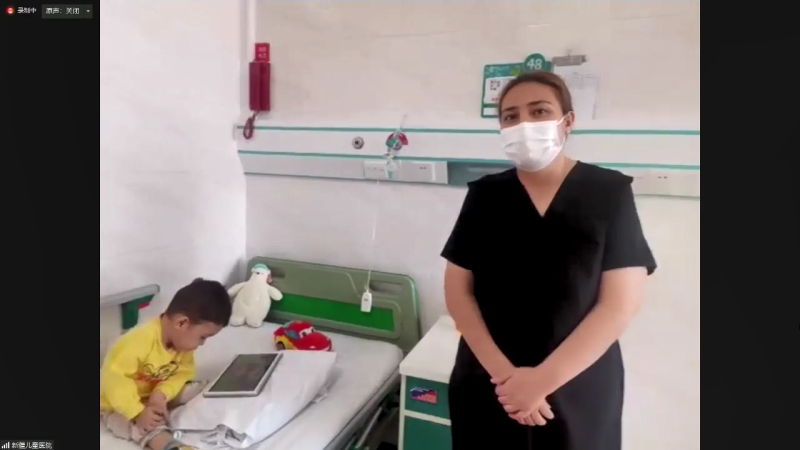
Photo taken on September 19, 2022 shows Aliya Keram, a resident of Tashkoruk Township, Yining City, Ili Prefecture speaks via video link at the 79th Press Conference on Xinjiang Uygur Autonomous Region. Photo by Xinjiang Daily/ Cheng Weiqiang
Aliya Keram, the child 's mother: Hello, my name is Aliya Keram. I come from Tashkoruk Township, Yining City. This is my child Alifar Abbas. He is 3 years old. After he became ill, I released a piece of help-seeking information on the "Pomegranate Cloud 12345 Platform" on the afternoon of August 20, and quickly received feedback from the governments of both Yining and Urumqi. On the early morning of August 21, we took an ambulance and rushed directly to Urumqi from Yining. At 15:00 p.m., we arrived at Xinjiang Children 's Hospital where my child was later successfully treated. Now, he will be discharged very soon. Apparently, my child has received a lot of help from all sources. I am really grateful for so many good people in society. Particularly, I would like to thank the doctors of Xinjiang Children's Hospital for their efforts!
Xu Guixiang: Next, let’s start a video link with Zurikana Mamuk, a resident of Jiefang Road, Yining City, Xinjiang. She will introduce to us how her family is living during the static management.
Xu Guixiang: what is the life of our residents and how do they spend each day during the outbreak under the condition of static management. Next, we are about to connect a family.
Xu Guixiang: Hello! We are holding a press conference to introduce the situation of epidemic prevention and control in Xinjiang to friends from the media and people from all sectors. We also particularly want to learn how your lives are during the outbreak. What is the basic situation and how many people are there in your family?

Photo taken on September 19, 2022 shows Zulkana Mamuk, a resident of Jiefang Road, Yining City, Ili Prefecture speaks via video link at the 79th Press Conference on Xinjiang Uygur Autonomous Region. Photo by Xinjiang Daily/ Cheng Weiqiang
Zurikana Mamuk: There are currently four people in our family: my mother, my two kids, and I. We are staying at home as required due to the epidemic.
Xu Guixiang: How old are your children?
Zurikana Mamuk: The elder one is nine years old and the younger is seven years old.
Xu Guixiang: Are they attending schools?
Zurikana Mamuk: Yes.
Xu Guixiang: Since it is not possible to conduct any normal teachings now on campus, so what about their learnings(learning)?
Zurikana Mamuk: Now they are taking online courses, and are being instructed online by their teachers every day.
Xu Guixiang: In this way, their studies will not be delayed. How old is your mother?
Zurikana Mamuk: My mother is 76 years old and is basically in good conditions, except with some cardiac diseases and hypertension.
Xu Guixiang: During the epidemic, what if you need any necessities for household use?
Zurikana Mamuk: During the outbreak, community staff and volunteers are in place to buy daily supplies for our residents. As long as volunteers are told or requests are sent in the WeChat group, they are able to fetch whatever we need, such as rice, noodles, oil, vegetables or fruits. It’s very convenient.
Xu Guixiang: If your mother needs to see a doctor or take medicines, is there any inconvenience? Is it difficult to do so?
Zurikana Mamuk: My mother suffers from heart disease and hypertension, so she is in constant need of relevant medicinal support. As long as we contact pharmacies for certain medicines, volunteers or community staff could go and buy for us at any time. It is also very convenient. The community staff and volunteers in our neighborhood have been working so hard to serve us during the epidemic.
Xu Guixiang: You should have been staying at home under static management for a while. How are you feeling now, and do you have confidence in the near future?
Zurikana Mamuk: I do have confidence. I’ve been taking care of my mother and two kids at home and cooking for them every day. It is also a period of time when they could enjoy my company all along. The children are taking online courses, and for my part, I have to guide them on their homework. What a full day!
The community staff have been disinfecting our neighborhood every day, providing free nucleic acid testing for all residents and free necessities to those in need, and caring for the elderly without family. As local residents, we should cooperate well with the community by staying indoors as required and ensuring personal protection from the virus. It is also our hope that the epidemic can end earlier, and our life and work can return to normal soon.
Xu Guixiang: Ok, thank you very much. Thank you for your understanding and support of community workers and the anti-epidemic measures taken by the government. At the same time, best wishes to your mother and children. Let’s work together to end this outbreak as soon as possible and embrace the return to normal life.
Xu Guixiang: The above 10 representatives from the Health Commission of the Autonomous Region, Xinjiang CDC, Xinjiang Children's Hospital and Ili Kazakh Autonomous Prefecture introduced on the situation of the epidemic response in Xinjiang, especially that of Ili Prefecture. I believe that everyone is gaining a further understanding of the collective anti-epidemic efforts made by people of all ethnicities in Xinjiang. I hope you will introduce more to the international community on the useful practices and outcomes of Xinjiang’s Covid response. After the end of the epidemic, friends from the press are welcomed to Xinjiang, especially to Ili Prefecture to see with your own eyes how the production and living conditions of the people are secured.
Next, floor is open for your questions.
If there’s no more question, this will be the end of today’s briefing. Thank you!









